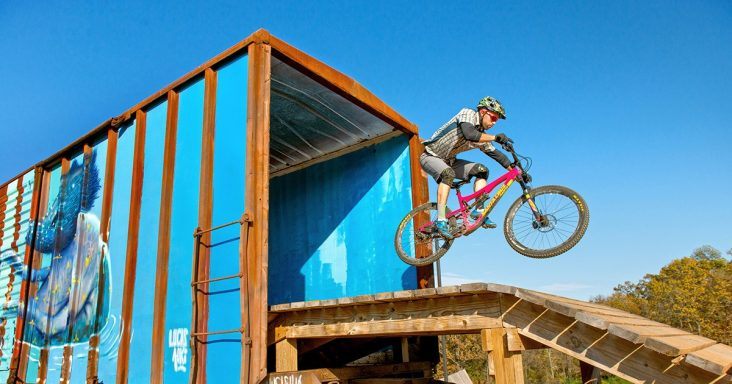Report: Bikes, trail system boost NWA economy by $137 million
by March 29, 2018 12:24 pm 3,105 views

The Railyard in downtown Rogers. Photo courtesy Arkansas Department of Parks and Tourism
Northwest Arkansas’ robust economy is powered, in part, by bicycles.
That’s according to three new studies commissioned by Bentonville-based Walton Family Foundation (WFF) and released Thursday (March 29), which say cycling contributed $137 million to the Northwest Arkansas economy in 2017.
The economic impact is broken down into health-care related costs ($86 million) by keeping children and adults active and decreasing the prevalence of adverse health conditions, and business benefits ($51 million) that include spending, retail sales and sales taxes and tourism spending by out-of-state visitors. The foundation also has been active in soliciting support from public and private entities for biking trails and related amenities.
Collectively, the three studies examine the economic impact of bicycle tourism in the region, who is using the trail systems, and how the data compares to 10 other cities in the U.S.
In the past decade, Northwest Arkansas has grown to include 350 miles of natural-surface trails and shared-use paved paths spanning the region, according to the WFF.
Over the past two years, according to WFF official Tom Walton, the number of cyclists and pedestrians using the trail system has increased to levels that continue to rival areas like San Francisco and San Diego County, when compared on a per capita basis.
WFF has played a significant role in the growth. The organization’s financial support started 10 years ago with a grant to build five miles of singletrack — a type of mountain biking trail — near downtown Bentonville. Since then, the foundation has given $74 million to support the construction of 163 miles of natural-surface trails and paved paths in Northwest Arkansas. The most notable project is the $38-million Razorback Regional Greenway, a 36-mile shared-use paved trail from south Fayetteville to Bella Vista. It opened in the spring of 2015 after more than six years of construction.
Outside of Northwest Arkansas, the foundation is supporting development of a 30-mile expansion of the Big River Trail in the Arkansas Delta. Walton and his brother Steuart Walton have also provided funding for trail building initiatives in other areas of the state — a 16-mile natural-surface trail system in Hot Springs; a bike and skate park in Fort Smith; mountain biking and hiking trails in Eureka Springs; and a 12-mile natural-surface trail system at Camp Orr on the Buffalo River.
Tom Walton, the WFF’s Home Region Committee chairman and a grandson of Walmart Inc. founders Sam and Helen Walton, said the Northwest Arkansas results are cause for celebration, but they also confirm there’s still untapped opportunity.
“Connectivity improvements for safer streets will encourage more cyclists and unleash new potential for commuters,” Walton said. “And while the percentage of women cycling in Northwest Arkansas (41%) is higher than the national average (37%), we still need to do more to diversify ridership.”
Some key findings from the three studies include:
- Nearly 1/3 of Northwest Arkansas residents consider the availability of paved bicycle infrastructure important on deciding where to live;
- More residents in Bentonville (44%) rode a back in the past year than any other city in the region;
- Annual bicycle usage in Northwest Arkansas increased by 24% between 2015 and 2017;
- Northwest Arkansas (5.45) has more cyclists per capita than San Francisco (3.2);
- Pedestrian traffic on the region’s trail system grew by 10% between 2015 and 2017.
Other key findings can be found here.
